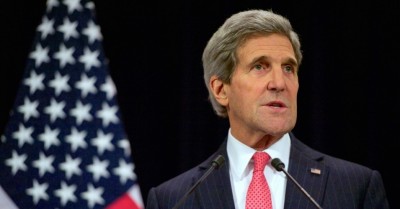Obama Wants Authority to Deploy Ground Troops in Iraq and Syria: U.S. Secretary of State Kerry Makes It Clear
Kerry confirms proposed AUMF would allow for boots-on-the-ground in fight against the Islamic State

Secretary of State John Kerry holds a news conference at NATO headquarters in Belgium December 3, 2014. (Photo: State Department/Public Domain)
U.S. Secretary of State John Kerry confirmed on Tuesday that the Obama administration is, in fact, seeking approval for the deployment of ground troops to participate in combat operations against Islamic State forces.
At a Senate Appropriations Committee hearing on Tuesday, Kerry clarified the administration’s position for boots-on-the-ground soldiers outlined in President Obama’sproposed authorization for the use of military force (AUMF), submitted to Congress earlier this month.
“The 2001 AUMF has been stretched well beyond what Congress intended, and there is no reason to believe the 2015 AUMF will not as well.” —Marjorie Cohn, Thomas Jefferson School of LawThe AUMF’s wording in relation to ground troops has been criticized as vague and open-ended. The proposed text states, “The authority granted… does not authorize the use of the United States Armed Forces in enduring offensive ground combat operations.”
As numerous analysts have pointed out, the phrase “enduring offensive ground combat operations” is not a legal term and could open the door to significant troop deployments.
At the Senate hearing, Kerry confirmed that the proposal would allow for U.S. combat deployments on the ground but left the parameters ill-defined.
“If you’re going in for weeks and weeks of combat, that’s enduring,” he said. “If you’re going in to assist somebody and fire control and you’re embedded in an overnight deal, or you’re in a rescue operation or whatever, that is not enduring.”
According to Kerry, the White House believes that the language “left the president the appropriate level of discretion with respect to how he might need to do, without [any] room for interpretation that this was somehow being interpreted to be a new license for a new Afghanistan or a new Iraq.”
Kerry’s statements follow remarks by White House Press Secretary Joshua Earnest, made immediately following the mid-February release of the proposal, that the AUMF’s language was intentionally vague because “we believe it’s important that there aren’t overly burdensome constraints that are placed on the commander in chief.”
When asked if the term “enduring” could be quantified, Earnest responded, “Well, I wouldn’t have a specific number to assign to that word.”
The Obama administration is already moving forward with troops deployments, despite that Congress has not yet held a vote on the proposed AUMF. In addition to the 3,000 U.S. troops ordered to deploy to Iraq beginning in the late summer of 2014, more than 4,000 U.S. troops are also currently headed to Kuwait.
At the Senate hearing Tuesday, Kerry stated he believes there is “no real need” to revisit or reevaluate the 2001 AUMF.
That controversial piece of legislation was passed in the wake of September 11th, 2001 and has been expansively interpreted by the Bush and Obama administrations to authorize ongoing war and occupation in Afghanistan; covert drone wars in Pakistan, Yemen, and Somalia; military intervention in countries from Ethiopia to Iraq; indefinite detentions at Guantanamo Bay and Bagram prison; and additional military operations elsewhere around the globe.
While the White House proposal calls for a repeal of the 2002 AUMF, which authorized the 2003 invasion of Iraq and use of force against Saddam Hussein, it leaves the 2001 AUMF in place.
Anti-war groups have slammed the 2001 AUMF as a “blank check” for endless war, and even President Barack Obama has previously criticized the authorization as too expansive.
However, many have warned that the 2001 AUMF has much in common with the president’s latest proposal. In addition to the vague language about troop deployments, the proposed AUMF for the ISIS war is geographically limitless, broadly defines the enemy, and would extend authorization for another three years, at which point the next administration could renew it.
Moreover, Marjorie Cohn, professor at Thomas Jefferson School of Law, recently warned, “The 2001 AUMF has been stretched well beyond what Congress intended, and there is no reason to believe the 2015 AUMF will not as well.”

